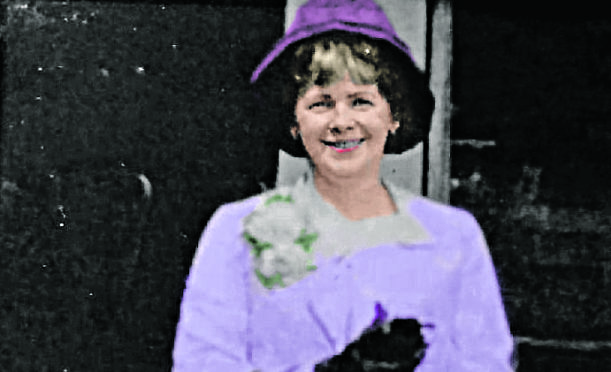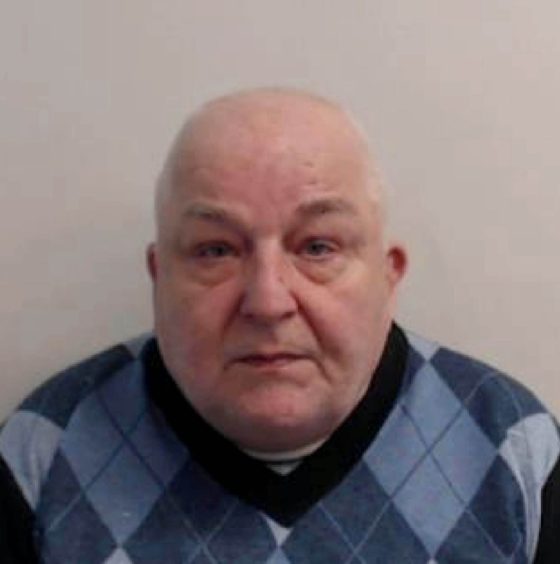
It took a jury just two hours to find Graham McGill guilty on Friday of the 1984 murder of Mary McLaughlin.
For Martin Cullen, plagued by nightmares ever since he discovered his mother’s body all those years ago, it ended decades of anguish and the belief the killer would somehow always evade justice.
McGill, 59, was finally snared after forensic scientists, conducting a fifth review of the evidence, found a DNA sample. The chances of it belonging to someone other than repeat sex offender McGill were 85,000 to one. Another sample, found on her dress, was a billion-to-one chance of not being his.
Martin, 60, of Whiteinch, Glasgow, said: “There’s no joy at the verdict but there’s justice and my mum can finally rest in peace. It has been years of torture for everyone in the family and there is a sense of relief. He is a revolting individual and it brings some comfort to think that he will never again see anywhere other than the inside of a prison.”
McGill was out on day release from prison when he murdered Mary, 58, a mum-of-11, gran-of-26 and great gran. He followed her home, got into her flat and strangled her with her dressing gown cord. Her body was found six days later, on October 2, 1984, when Martin went to visit.
He was met with the sight of his mum lying on her bed with the ligature wound round her neck three times so tightly he didn’t even realise at first that she had been attacked.
At McGill’s trial, delayed repeatedly due to the pandemic, jurors last week were shown a seven-minute video of the interior of Mary’s flat, taken on the day her body was found. It showed her lying on her back on her bed wearing a green dress, her dentures on the floor beside her.
McGill, a known sex offender, was identified via DNA as the prime suspect after the most recent cold case review of Mary’s murder began around five years ago.
Recalling the moment he feared would never happen, Martin said: “Two police officers came to my door on December 4, 2019, and said they had arrested someone and he was due in court the next day. That was it. To receive that news, after 35 years, was an incredible moment. I’d always hoped it would happen, but doubted it actually would. I was totally shocked and just broke down.
“The last 36 years have been difficult but the past year brought a new level of stress for us as we wondered what would happen. The trial was put off half a dozen times due to delays and the pandemic. It became almost unbearably stressful.
“My brother Michael had cancer and passed away in November as we waited for the trial. He never lived to see this moment of justice for our mum, and that was upsetting for us all.
“This verdict is a relief for all of us and Michael would have been satisfied at the outcome. Mum was just a wee woman and I loved her. She liked socialising, going to the pub and playing dominoes. She stayed with her partner at the time, who worked on the ferries in Oban.
“They would stay at a hotel up there or at her flat. He was working up there at the time. He passed away a couple of years ago.
“I stayed in Ayrshire at the time but would go to visit her every week or so. I went to the door of her flat and suspected something was wrong with the smell coming from inside.
“I kicked the door in and went inside with my then partner. We found her lying on the bed. The sight of my mum’s body when I found it frightened the life out of me and has tortured me ever since.
“It was terrifying, as was going to the City Mortuary to identify her later.
“Sitting in court watching the video of my mum’s house which they took in 1984, with her body decomposing, her hand black in colour and her false teeth lying on the floor, was a horrendous experience. It brought it all back but it was my choice to watch it.
“What happened has preyed on my mind since 1984. It never goes away. We appreciate the work that has been put in, especially in the last few years. We dared to hope for the right outcome and for justice for our mum and, eventually, it happened.”
McGill, of Glasgow, was convicted of assaulting Mary by strangling her with a ligature and murdering her on September 26 or 27, 1984, at her flat in Crathie Court in the city’s Partick area. The jury deleted an assault on Mary with intent to rape from the charge.
Prosecutor Alex Prentice QC revealed that, at the time of Mary’s murder, McGill, then 22, who worked as a fabricator, was on day release from HMP Edinburgh where he was serving a six-year sentence for assault with intent to ravish and rape imposed in 1981.
The prosecutor told the court McGill was also jailed for life in 1999 for assault with intent to ravish and was out on licence from that when he was arrested and charged with Mary’s murder on December 4, 2019.
As well as DNA evidence used against him, the jury also heard that McGill confessed in 1988 to his ex-wife Suzanne Russell that he had murdered a woman as he “wanted to know what it felt like to kill someone” and said he was shocked how long it took to actually murder Mary.
Ms Russell said: “I didn’t believe him. He threatened me and said if I ever told anyone he would kill me and, if I ever reported it or tried to leave him, that’s what would happen.”
Prosecutor Prentice told jurors: “What we have is a murder with a sexual motivation. Her dress was on the wrong way round and her bra was found outside. The brutal attack on her indicates force.”
McGill showed no emotion nor gave any evidence during the trial and sat with his head bowed in the dock for the duration. He will be sentenced on May 18 at the High Court in Aberdeen. Judge Lord Burns told jurors: “It has been a distressing and difficult case.”
Detective Superintendent Suzanne Chow said afterwards: “Despite crimes occurring years ago, there is always hope of solving them one day. They are never forgotten. Mary’s family has waited a long time for justice and I hope this verdict provides some form of resolution for them.
“It is fitting to know that despite the passage of time, justice has finally been served. In all case reviews, families are uppermost in our minds and we work hard to present the best evidential case to ensure successful convictions.”
The cord used to strangle victim held evidence to convict the killer
The successful conviction of Graham McGill relied on using DNA analysis in a cold case review.
Advances in science meant stored evidence, which could not be tested for DNA at the time, was able to reveal the identity of the prime suspect.
McGill’s DNA was finally traced inside the knot of a dressing gown cord 30 years after he used it to strangle Mary McLaughlin.
Forensic scientists persisted with a string of reviews into the 1984 murder of Mary as advances in science with the passage of time opened up opportunities not previously available to them.
After scientific examinations at the time of the murder proved inconclusive, cold case reviews to try to obtain DNA samples were carried out in 1999, 2002 and 2006. It was only after a fifth attempt began in 2014 that forensic scientists Joanne Cochrane and Nighean Stevenson finally located what was to prove a sample of McGill’s DNA.
At the High Court in Glasgow last week, Cochrane told prosecutor Alex Prentice QC: “We felt that the inside of the knot might be protected from contamination. We felt there was a possibility of receiving DNA from there. We did it very slowly and took photographs at all stages. It was very difficult to unfasten.”
Cochrane said the latest analysis found a mixed DNA profile with a major profile attributed to Mary and a minor one to McGill. She told jurors that the likelihood of the DNA belonging to someone other than McGill was 85,000 to one.
The chance of DNA on a cigarette butt found nearby and on Mary’s dress not being from McGill was one billion to one and for the bra it was 320 to one.
Prentice, who described the evidence inside the knot as like “a time capsule” back to 1984, asked: “Has DNA analysis greater opportunities now?”
Cochrane replied: “Yes, as new technology comes on, we now have the gold standard of DNA profiling.”

Enjoy the convenience of having The Sunday Post delivered as a digital ePaper straight to your smartphone, tablet or computer.
Subscribe for only £5.49 a month and enjoy all the benefits of the printed paper as a digital replica.
Subscribe © Jamie Williamson
© Jamie Williamson © POLICE SCOTLAND
© POLICE SCOTLAND